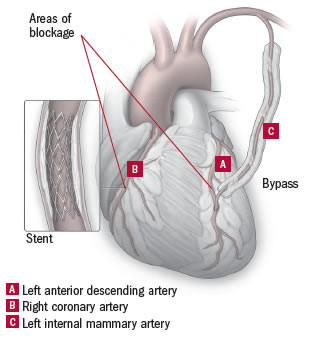
New thinking about plaque in arteries that feed the brain

Want to prevent shifting teeth? Maybe you need retainers

New evidence that polyphenol-rich foods help the heart

What you need to know about the new dietary guidelines

Food that’s healthier for people and planet can be cheaper, too

What are somatic workouts?

How to curb your stress eating

8 simple ways to reduce ultra-processed foods in your diet

How to spot Parkinson’s disease symptoms

Heart failure symptoms in women: How they’re different
Heart Failure Archive
Articles
Monitoring your heart rhythm with a smartphone: A good call?
An app that detects an irregular heart rhythm could be reassuring for people worried about afib.
Image: Prykhodov /Thinkstock
Just over two years ago, the FDA approved the AliveCor Heart Monitor, which consists of a smartphone app plus a phone case with special sensors on the back. Touching the sensors with your fingers allows you to see a simple version of your heart's electrical activity on the phone screen. In the latest version, called Kardia, the sensors just need to be near (not necessarily on) your phone. The readout reveals if your heart rhythm looks normal or if you appear to have atrial fibrillation (afib)—a rapid, irregular heart rhythm that raises the risk of stroke.
Currently, several new smartphone apps to alert you about possible afib using just the phone itself—no special case required—are under development. Recent research suggests they're about as accurate as the Kardia system, although they haven't yet been cleared by the FDA and aren't on the market. If and when they are, could these apps help improve afib screening?
Flu vaccine offers benefits to patients with heart failure
New research found that heart failure patients who had a flu shot had a 30% lower risk of hospitalization for cardiovascular disease, 16% lower risk of hospitalization for respiratory infections, and a 4% lower risk of hospitalization in general.
While waiting for your flight, learn how to save a life
Research we're watching
Image: Highwaystarz/Thinkstock
If your summer vacation plans include a stop at one of the nation's major airline hubs, you can put your waiting time to good use by learning cardiopulmonary resuscitation (CPR). The American Heart Association and the Anthem Foundation partnered to provide interactive training kiosks that teach people how to perform hands-only CPR in just five minutes. The pilot kiosk program at the Dallas/Fort Worth International Airport has trained more than 25,000 people so far.
The training includes a short a "how-to" video followed by a practice session on a rubber torso. You'll receive feedback about proper hand placement and the correct depth and rate of chest compressions—factors that influence the effectiveness of CPR. More than 20% of the estimated 359,000 cardiac arrests that occur outside the hospital each year happen in public places like airports, casinos, and sporting facilities.
Sweetened drinks and heart failure
Image: Bigstock
News briefs
Here's another reason to take sweetened drinks out of your diet: a study published online Nov. 2, 2015, by the journal Heart suggests that drinking sweetened beverages each day is linked to an increased risk for heart failure in men. Heart failure is a gradual decline in the heart's ability to pump enough blood to meet the body's needs. Researchers tracked the dietary information of 42,000 middle-aged or older men in Sweden from 1998 to 2010. They made no distinction between types of drinks or how they were sweetened, whether it was with sugar, fructose, or artificial sweetener. However, coffee, tea, and fruit juice were not included in the study. After excluding potentially influential factors, researchers noted that men who drank at least two daily servings of sweetened drinks had a 23% heightened risk of developing heart failure compared with men who didn't drink sweetened beverages. The study didn't prove that sweetened drinks caused heart failure. In fact, the researchers pointed out that drinking a lot of sweetened beverages is usually an indication of a poor diet, which is a risk factor for heart failure in itself. But they also noted that sweetened drinks are associated with obesity and type 2 diabetes, which are risk factors for heart failure, too. Best advice: avoid sweetened beverages or at least limit them to occasional consumption.
Research we're watching: A better way to predict fatal heart events
In emergency departments, doctors routinely test blood levels of a protein called troponin to diagnose people with suspected heart attacks. That's because damaged heart muscle releases troponin into the bloodstream. Now, new research suggests that a high-sensitivity troponin test may help identify people with heart disease who face a high risk of fatal heart events.
For the study, published in the August 13 issue of The New England Journal of Medicine, researchers measured troponin levels with the high-sensitivity test in nearly 2,300 people with type 2 diabetes and stable heart disease (meaning they had narrowed heart arteries and chest pain but not a heart attack). Within five years, nearly one in three people with elevated troponin levels had a heart-related problem or died from one.
Managing a leaky mitral valve
Even if you don't have symptoms, repairing the valve sooner rather than later may be a wise choice.
The four valves of your heart work like one-way swinging doors, opening and closing in a perfectly timed sequence to propel blood through your heart and the rest of your body. But the leaflets (flaps of tissue that make up the valves) and nearby structures don't always function as they should. Perhaps because of the higher pressures in the heart's left side, the valves there are particularly vulnerable to problems. That includes the mitral valve, which separates the left upper and lower chambers of the heart (see illustration).
Cardiac arrest during sports is rare, and there may be warning signals
Reports that someone thought to be "perfectly healthy" collapsed while playing sports may instill fear in middle-aged men who want to stay physically active. However, a study in Circulation found that sudden cardiac arrest (SCA) during sports activities is uncommon and is often preceded by possible symptoms of heart problems.
Researchers have tracked cases of SCA in Oregon since 2002 in adults ages 35 to 65. As of 2013, only 63 of the 1,247 SCAs they found, or 5%, happened either during or within one hour of engaging in activities such as jogging, bicycling, basketball, golf, or tennis. It occurred more often in men, although it's possible this was because the men were more likely to engage in sports than women.
Bypass plus angioplasty: The best of both worlds?
In hybrid heart surgery, the blocked or narrowed left anterior descending artery is bypassed with the nearby left mammary artery, while another blocked artery (in this case, the right coronary artery) is opened with angioplasty plus a stent. Illustration by Scott Leighton |
Known as hybrid coronary revascularization, this technique may become more widely available in the future.
The future of heart rhythm monitoring?
Small, wireless skin patches may offer a convenient way to diagnose—or rule out—arrhythmias.
An abnormal heart rhythm—when your heartbeat is too slow, too fast, or irregular—may be a fleeting, harmless event. But it might be a sign of a more serious heart condition. If you have frequent palpitations (which feel like your heart is pounding, racing, or fluttering) or unexplained fainting spells, your doctor may recommend a Holter monitor. This portable electrocardiogram (ECG) machine records your heart rhythm over a day or two.
Ask the doctor: Pacemakers and MRI scans
Q. I have a pacemaker and was told to never have an MRI scan. Is there any way around that?
A. In the past, people with pacemakers were told never to have magnetic resonance imaging (MRI), but in certain cases it may be safe.

New thinking about plaque in arteries that feed the brain

Want to prevent shifting teeth? Maybe you need retainers

New evidence that polyphenol-rich foods help the heart

What you need to know about the new dietary guidelines

Food that’s healthier for people and planet can be cheaper, too

What are somatic workouts?

How to curb your stress eating

8 simple ways to reduce ultra-processed foods in your diet

How to spot Parkinson’s disease symptoms

Heart failure symptoms in women: How they’re different
Free Healthbeat Signup
Get the latest in health news delivered to your inbox!
Sign Up









